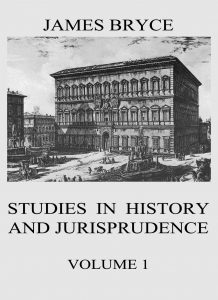Studies in History and Jurisprudence Vol. 1 – James Bryce
This volume contains a collection of studies composed at different times over a long series of years. It treats of diverse topics: yet through many of them there runs a common thread, that of a comparison between the history and law of Rome and the history and law of England. The author has handled this comparison from several points of view, applying it in one essay to the growth of the Roman and British Empires, in another to the extension over the world of their respective legal systems, in another to their Constitutions, in others to their legislation, in another to an important branch of their private civil law. The topic is one profitable to a student of the history of either nation; and it has not been largely treated by any writers before Bryce, as indeed few historians touch upon the legal aspects of history. This is volume one out of two.
Format: Paperback.
Studies in History and Jurisprudence Vol. 1.
ISBN: 9783849678531
Available at amazon.com and other venues.
Bryce as Ambassador to the United States (from Wikipedia):
However, even this time, Bryce’s cabinet post was held only for a brief period because as soon as February 1907, he was appointed British Ambassador to the United States of America. He kept this diplomatic office until 1913 and was very efficient in strengthening the Anglo-American friendship. Bryce made many personal friends in American politics such as US President Theodore Roosevelt. The German ambassador in Washington, Graf Heinrich von Bernstorff, later admitted how relieved he felt that Bryce was not his competitor for American sympathies during the World War period even though Bernstorff managed to keep the US from declaring war until 1917.
As an author, Bryce quickly became well known in America for his 1888 work, The American Commonwealth. The book thoroughly examined the institutions of the United States from the point of view of a historian and constitutional lawyer and at once became a classic. In developing material for his book, Bryce painstakingly reproduced the travels of Alexis de Tocqueville, who wrote Democracy in America (1835–40). Although Tocqueville emphasized the egalitarian nature of early-19th-century America, Bryce was dismayed to find vast inequality: “Sixty years ago, there were no great fortunes in America, few large fortunes, no poverty. Now there is some poverty… and a greater number of gigantic fortunes than in any other country of the world” and “As respects education… the profusion of…elementary schools tends to raise the mass to a higher point than in Europe… [but] there is an increasing class that has studied at the best universities. It appears that equality has diminished [in this regard] and will diminish further.” The work was heavily used in academia as a result of Bryce’s close friendships with men such as President James B. Angell of the University of Michigan and successively Charles W. Eliot and Abbott Lawrence Lowell at Harvard. Against the backdrop of the New Immigration of the late nineteenth century, the work also became a key medium for popularising the view of American history as distinctly Anglo-Saxon, comparable with similarly exceptionalist “Whig” histories written in late Victorian Britain.
(The text of the last section was taken from a Wikipedia entry and is available under the Creative Commons Attribution-ShareAlike License.)
Publisher’s Note: This book is printed and distributed by Createspace a DBA of On-Demand Publishing LLC and is typically not available anywhere else than in stores owned and operated by Amazon or Createspace.

